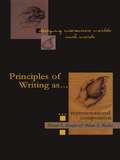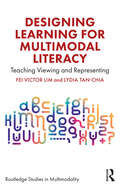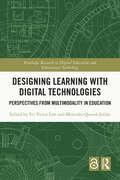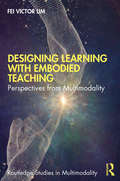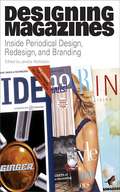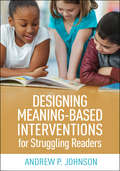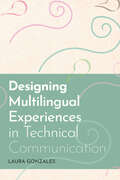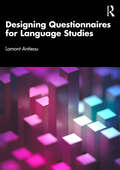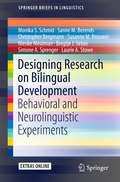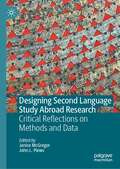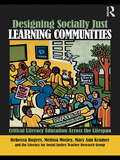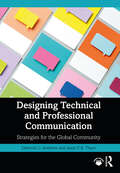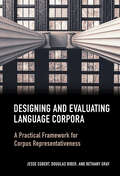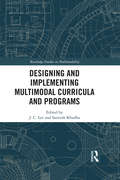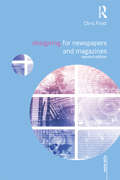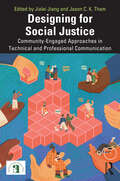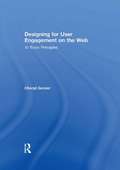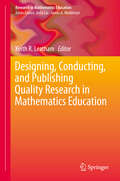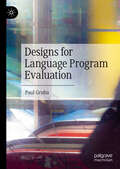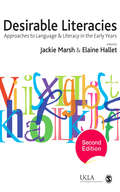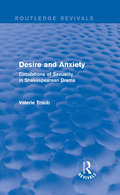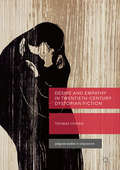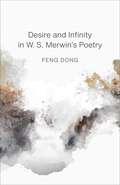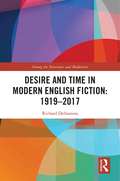- Table View
- List View
Designing Interactive Worlds With Words: Principles of Writing As Representational Composition
by David S. Kaufer Brian S. ButlerNo two writing situations are exactly the same and skilled writers, like skilled painters, must develop the know-how to represent the objects of their writing as part of a flexible art. This special art of writing lies hidden between grammar--the well-formedness of sentences--and genre--the capacity of texts to perform culturally holistic communicative functions (e.g., the memo, the strategic report, the letter to the editor). Concealed between grammar and genre, this less visible art of writing is what Kaufer and Butler call "representational composition." Texts within this hidden art are best viewed not primarily as grammatical units or as genre functions, but as bearers of design elements stimulating imagistic, narrative, and information-rich worlds, and as an invitation to readers to explore and interact with them. This volume presents a systematic study of the principles that underlie writing as representational composition. Drawing from student models derived from a studio method, the authors use each chapter to present a different aspect of what unfolds--across the course of the book--into a cumulative, interactive, and unified body of representational principles underlying the design of texts. They reveal what makes the textual representations achieved by expert writers worthwhile, and, at the same time, difficult for novice writers to reproduce. Extending the framework of their 1996 volume, Rhetoric and the Arts of Design, into a realm of textual design, this volume will interest students and instructors of writing, rhetoric, and information design.
Designing Learning for Multimodal Literacy: Teaching Viewing and Representing (Routledge Studies in Multimodality)
by Fei Victor Lim Lydia Tan-ChiaDesigning Learning for Multimodal Literacy addresses the need to design learning for multimodal literacy in a world that is increasingly saturated with print and digital media. In the current age, communication and interactions on social media are seldom made with language alone but are often accompanied with emojis, images, and videos, making meanings multimodally. Young people, including children, are also increasingly active in making videos of themselves, their ideas, and their experiences as part of their out-of-school literacy activities. In particular, for language teachers, the present shifts in our world require that teachers re-examine what they teach and how they can meaningfully and effectively teach the students in their classes today. At 8 years old, Alden created his own rap music video and shared it with the world. He wrote his own lyrics and set it against the music he remixed and meshed from a music download site. Alden is in your classroom today. As his teacher, what would you teach him? How would you engage him? Alden, and children like him, is the inspiration for why the authors have written this book. The changing times and changing learners place a demand on educators to continually reflect on what and how teachers are teaching their students – to ensure that learning in school remains relevant, relatable, and prepares them for the world of the future. Lim’s book outlines how teachers can design learning for multimodal literacy. It is a result of a collaboration between an educational researcher and a curriculum developer, and offers practical resources for practitioners but also design principles and considerations based on practice with a range of students to inform and inspire academics and postgraduate students. It is poised to contribute to the global conversation and interest on how educators can reflect on the zeitgeist of the digital age and design learning for multimodal literacy.
Designing Learning with Digital Technologies: Perspectives from Multimodality in Education (Routledge Research in Digital Education and Educational Technology)
by Fei Victor Lim Mercedes Querol-JuliánThis book offers a multimodal perspective on how to design meaningful learning experiences with digital technologies.Digital education is of increasing importance in today’s digital society and the editors bring together international thought-leaders and well-established academics across geographical regions to explore the topic. The book addresses the need to design learning with digital technologies, especially in a post-pandemic environment where blended learning has become ubiquitous. The book is organised around five themes: designing learning, digital learning designs, digital learning with embodied teaching, digital learning interactions, and digital multimodal literacies. The chapters focus on digital technologies as multimodal semiotic resources and the educational implication of each theme is drawn out from illustrative cases across contexts of learning.Essential reading for researchers and postgraduate students, this book offers state-of-the-art thinking on how educators can design new learning experiences for students through the meaningful and effective use of digital technologies.Chapter 1 of this book is freely available as a downloadable Open Access PDF at http://www.taylorfrancis.com under a Creative Commons Attribution-Non Commercial-No Derivatives (CC-BY-NC-ND) 4.0 license.
Designing Learning with Embodied Teaching: Perspectives from Multimodality (Routledge Studies in Multimodality)
by Fei Victor LimTeaching and learning involve more than just language. The teachers' use of gestures, the classroom spaces they occupy and the movements they make, as well as the tools they use, work together with language as a multimodal ensemble of meanings. Embodied teaching is about applying the understandings from multimodal communication to the classroom. It is about helping teachers recognise that the moves they make and the tools they use in the classroom are part of their pedagogy and contribute to the design of the students’ learning experience. In response to the changing profile and needs of learners in this digital age, pedagogic shifts are required. A shift is the evolving role of teachers from authority of knowledge to designers of learning. This book discusses how, using examples drawn from case studies, teachers can use corporeal resources and (digital) tools to design learning experiences for their students. It advances the argument that the study of the teachers' use of language, gestures, positioning, and movement in the classroom, from a multimodal perspective, can be productive. This book is intended for educational researchers and teacher practitioners, as well as curriculum specialists and policy makers. The central proposition is that as teachers develop a semiotic awareness of how their use of various meaning-making resources express their unique pedagogy they can use these multimodal resources aptly and fluently to design meaningful learning experiences. This book also presents a case for further research in educational semiotics to understand the embodied ways of meaning-making in the pedagogic context.
Designing Magazines: Inside Periodical Design, Redesign, And Branding
by Jandos RothsteinHow does a designer create graphic solutions to the behind-the-scenes editorial challenges at a magazine? Designing Magazines is the complete guide to understanding the inner workings of magazines and their day-to-day management--and a great guide to using that knowledge to create visually stunning, editorially effective magazines, in both new designs and rebranding. Thirty-five experienced editors, designers, and consultants, all at the top of their fields, present their insights on the goals and process of magazine design. Chapters focus on problems faced by designers, ethical considerations, the future of the field, and many more relevant but rarely discussed issues. A look at magazines that have risen above the crowd to achieve special social importance--and how design has been a part of that success--provides additional inspiration for magazine designers everywhere.
Designing Meaning-Based Interventions for Struggling Readers
by Andrew P. JohnsonThis highly practical book helps K–8 teachers implement effective reading interventions that support meaningful comprehension and engage students with interesting, age-appropriate texts. Andrew P. Johnson presents a range of strategies for addressing difficulties in the core areas of word identification, fluency, and comprehension. Packed with illustrative figures, the book provides guidance and tools for assessing reading problems, combining and adapting interventions for particular students, planning writing activities to enhance reading, aligning efforts within a response-to-intervention framework, and designing individualized education programs. Informed by current research, Johnson candidly targets "educational malpractice&” and helps readers puzzle through the controversies surrounding dyslexia diagnoses and special education decision making.
Designing Multilingual Experiences in Technical Communication
by Laura GonzalesAs technical communicators continue advocating for justice, the field should pay closer attention to how language diversity shapes all research and praxis in contemporary global contexts. Designing Multilingual Experiences in Technical Communication provides frameworks, strategies, and best practices for researchers engaging in projects with multilingual communities. Through grounded case studies of multilingual technical communication projects in the US, Mexico, and Nepal, Laura Gonzales illustrates the multiple tensions at play in transnational research and demonstrates how technical communicators can leverage contemporary translation practices and methodologies to engage in research with multilingual communities that is justice-driven, participatory, and reciprocal. Designing Multilingual Experiences in Technical Communication is of value to researchers and students across fields who are interested in designing projects alongside multilingual communities from historically marginalized backgrounds.
Designing Questionnaires for Language Studies
by Lamont AntieauDesigning Questionnaires for Language Studies is a guide to the design and use of questionnaires for empirical linguistic research, particularly in the areas of dialectology, sociolinguistics, and linguistic anthropology. Whether completed via written correspondence or through interviewing, questionnaires play an essential role in linguistic research. Yet, the design of questionnaires is rarely taught formally, leaving researchers to learn effective design in practice. This practical and accessible text offers structured, step-by-step guidance to provide researchers with the skills they need to make the most of questionnaire-based research. It also provides a history of the use of questionnaires in linguistic research and critically examines the assumptions and motivations inherent in their creation and administration, as well as that of the questions that populate them, and discusses how biases can negatively affect the outcome of the research itself. Experience using these tools in the field has led to their refinement over time. Armed with this knowledge, readers can make informed decisions about how to structure their own questionnaires as they embark on linguistic investigations or use it to better understand the results of previous research that has relied on questionnaires for data collection.
Designing Research on Bilingual Development
by Monika S. Schmid Sanne M. Berends Christopher Bergmann Susanne M. Brouwer Nienke Meulman Bregtje J. Seton Simone A. Sprenger Laurie A. StoweThis volume offers an in-depth description and discussion of research design for a large-scale investigation of bilingual development. It introduces and justifies a range of theoretical and methodological innovations, discusses some of the problems that come with these and proposes practical solutions. The present volume introduces a research design intended to capture a wide range of linguistic data, elicited by means of behavioral tasks, neuroimageing data and free speech from both second language learners and first language attriters of two languages (Dutch and German) representing a wide range of language combinations and ages of onset. Gathering and analyzing such a range of data comes with a multiplicity of problems, many of them linked to the fact that similar tests have to be designed across a range of languages and measurements will have to occur in various locations. The current volume presents a research design appropriate to these questions, discussing the methodological challenges of such a study. It offers advice on how to construct experimental materials which are parallel across different languages set up a protocol for additional measures which can be applied across a wide range of participants combine data from different labs when using different ERP equipment and different eyetrackers.
Designing Second Language Study Abroad Research: Critical Reflections on Methods and Data
by John L. Plews Janice McGregorThis edited book brings together contributions from scholars in different international and educational contexts to take a critical look at the design and implementation of second language Study Abroad Research (SAR). Examining data sources and types, research paradigms and methods, and analytic approaches, the authors not only provide insight into the field as it currently stands, but also offer recommendations for future research, with the aim of revitalizing inquiry in the field of SAR. This book will be of interest to applied linguists, as well as educators and education scholars with an interest in researching international study.
Designing Socially Just Learning Communities: Critical Literacy Education across the Lifespan
by Rebecca Rogers Mary Ann Kramer Melissa Mosley The Literacy for Social Justice Teacher Research GroupDemonstrating the power and potential of educators working together to use literacy practices that make changes in people's lives, this collaboratively written book blends the voices of participants in a teacher-led professional development group to provide a truly lifespan perspective on designing critical literacy practices. It joins these educators’ stories with the history and practices of the group - K-12 classroom teachers, adult educators, university professors, and community activists who have worked together since 2001 to better understand the relationship between literacy and social justice. Exploring issues such as gender equity, linguistic diversity, civil rights and freedom and war, the book showcases teachers’ reflective practice in action and offers insight into the possibilities and struggles of teaching literacy through a framework of social justice. Designing Socially Just Learning Communities models an innovative form of professional development for educators and researchers who are seeking ways to transform educational practices. The teachers' practices and actions – in their classrooms and as members of the teacher research group – will speak loudly to policy-makers, researchers, and activists who wish to work alongside them.
Designing Technical and Professional Communication: Strategies for the Global Community
by Deborah C. Andrews Jason C. ThamThis concise and flexible core textbook integrates a design thinking approach, rhetorical strategies, and a global perspective to help students succeed as technical and professional communicators in today’s multimodal, mobile, and global community. Design thinking and good communication practices are rooted in empathy and human values. The integrated approach fosters students' ability to address the complex problems they will face in their careers, where they will collaborate with people who present diverse expertise, cultures, languages, and values. This book introduces the knowledge and skills as well as agile activities that help students communicate on projects within local and global communities. Parts 1 and 2 introduce the strategies for design thinking, audience analysis, communicating ethically, collaborating professionally, and managing projects to define problems and implement solutions. In Parts 3 and 4, students learn to compose content in text and visuals. They learn to structure and deliver content by choosing the right genre and selecting effectively from the communication options available in today's multimodal environment. Designing Technical and Professional Communication serves as a flexible core textbook for technical and professional communication courses. An instructor’s manual containing exercises, sample syllabus, and guidance for teaching in a variety of settings is available online at www.routledge.com/9780367549602.
Designing and Evaluating Language Corpora: A Practical Framework for Corpus Representativeness
by Douglas Biber Bethany Gray Jesse EgbertCorpora are ubiquitous in linguistic research, yet to date, there has been no consensus on how to conceptualize corpus representativeness and collect corpus samples. This pioneering book bridges this gap by introducing a conceptual and methodological framework for corpus design and representativeness. Written by experts in the field, it shows how corpora can be designed and built in a way that is both optimally suited to specific research agendas, and adequately representative of the types of language use in question. It considers questions such as 'what types of texts should be included in the corpus?', and 'how many texts are required?' – highlighting that the degree of representativeness rests on the dual pillars of domain considerations and distribution considerations. The authors introduce, explain, and illustrate all aspects of this corpus representativeness framework in a step-by-step fashion, using examples and activities to help readers develop practical skills in corpus design and evaluation.
Designing and Implementing Multimodal Curricula and Programs (Routledge Studies in Multimodality)
by Santosh Khadka J. C. LeeThis volume presents a comprehensive overview of multimodal approaches to curriculum and programmatic implementation across a diverse range of teaching environments and across geographic and cultural boundaries. Featuring contributions from scholars within and across both disciplines, the book examines the ways in which new technologies link to expanding definitions of literacy and, building on this, how multimodal approaches might most effectively address the unique opportunities and challenges instructors face in contemporary classrooms and professional development programs. Chapters draw on case studies from both existing scholarship and findings from the authors’ own experiences in practice, including examples from writing, rhetoric, and composition courses, open online learning courses, and interdisciplinary faculty training programs. The final section of the book showcases how the conversation might be further extended to address increasingly multilingual classrooms by exploring how multimodality has been implemented in transnational settings. Engaging with key questions at the intersection of programmatic and curricular development and multimodal studies, this book is a fundamental resource for graduate students and scholars in multimodality, rhetoric studies, language education, applied linguistics, and communication studies.
Designing for Newspapers and Magazines (Media Skills)
by Chris FrostA hugely beneficial introduction to students and professionals in print media and design, Designing for Newspapers and Magazines offers guidance on how to produce attractive publications and how to tailor them to their target audience using colour, text placement, typography and images.Written by an experienced journalist and designer, the book details the elements of good design and provides instruction on how to get the most of computers and computer-aided design.The book examines a broad range of local and national publications including The Sun, The Daily Mirror and Glamour magazine and explains the reasoning that underpins their design choice, including: how to set up a new publication planning an edition of a newspaper or magazine typography and working with text working with images and technical production designing pages and how to use colour design and journalism ethics a glossary of journalistic and design terms
Designing for Social Justice: Community-Engaged Approaches in Technical and Professional Communication (ATTW Series in Technical and Professional Communication)
by Jialei Jiang Tham, Jason C. K.Exploring the intersection of design research and community engagement, this book highlights the ways in which design and design theories can be used to address social justice issues and promote positive change in communities.Contributors illuminate the theoretical, ethical, and pedagogical dimensions of design-driven methods in community-engaged projects, exploring their potential to address critical social justice issues such as ethnic and racial justice, gender equality, disability justice, cultural diversity, equity, and environmental justice. Chapters examine various aspects of community-engaged practices, including the use of design theories to fuel social justice work in community partnerships, ethical issues surrounding the use of multimodal resources and new media technologies, and pedagogies for promoting social change. Addressing the opportunities and challenges of design and design methods in community engagement, this collection offers suggestions for promoting social justice through technical and professional communication activities and pedagogies.Investigating the design of community-engaged projects from a critical standpoint, this book will appeal to scholars and students in the fields of Technical and Professional Communication, Writing and Composition Studies, and Rhetoric. It will also be of interest to administrators, community partners, and professionals working in service-learning contexts.
Designing for User Engagement on the Web: 10 Basic Principles
by Cheryl GeislerDesigning for User Engagement on the Web: 10 Basic Principles is concerned with making user experience engaging. The cascade of social web applications we are now familiar with — blogs, consumer reviews, wikis, and social networking — are all engaging experiences. But engagement is an increasingly common goal in business and productivity environments as well. This book provides a foundation for all those seeking to design engaging user experiences rich in communication and interaction. Combining a handbook on basic principles with case studies, it provides readers with a rich understanding of engagement: extending a welcome, setting the context, making a connection, sharing control, supporting interaction, creating a sense of place, and planning to continue the engagement. Based on research funded by the Society for Technical Communication, the case studies illustrate how designers build community in order to support education, connect kids to community resources, introduce users to other cultures, foster collaboration, encourage activism, and much more. Whatever your motive, if you aim to create engaging user experiences, you will want to explore Designing for User Engagement on the Web.
Designing, Conducting, and Publishing Quality Research in Mathematics Education (Research in Mathematics Education)
by Keith R. LeathamThe purpose of this book is to collect, organize and disseminate collective wisdom with respect to designing, conducting, and publishing quality research in mathematics education. This wisdom will be gleaned from among those who, over the past several decades, have been instrumental in guiding the field in the pursuit of excellence in mathematics education research—insightful editors, educative reviewers, prolific writers, and caring mentors. Each chapter is written to the novice researcher with the intent of aiding them in avoiding common pitfalls, navigating difficult intellectual terrain, and understanding that they are not alone in experiencing rejection, frustration, confusion, and doubt. This book differs from existing literature in the sense that it is written about the enterprise of designing, conducting and publishing research in mathematics education as opposed to being reports of the results of such work. It also differs in the sense that it is written with the intent to mentor the rising generation as opposed to capture the state of the field (as would happen in a handbook, for example). It is written for the express purpose of helping the field work collectively to aid in the often isolated enterprise of mentoring new researchers. The primary audience is a potentially wide one: graduate students, novice researchers, graduate faculty, advisors, and mentors – or anyone seeking to improve their own abilities to design, conduct, and publish quality research in mathematics education.
Designs for Language Program Evaluation
by Paul GrubaThis book aims to advance language program evaluation and practice, building on the author's previous work in Blended Language Program Evaluation (Palgrave Macmillan, 2016). The book is based in theory, yet incorporates case study examples throughout each chapter. The conceptual framework is grounded in complexity and evaluative thinking, and incorporates a three-tiered approach on themes ranging from 'hybrid learning' through to 'leadership' and 'sustainability'. The style of the work seeks to engage stakeholders through its focus on utility and program improvement, and result in pragmatic, evidence-based results that foster quality teaching, learning, and administration. Despite being situated in a multibillion dollar global industry, few language professionals evaluate their language programs and foster improvement. This book is addressed to current language professionals and researchers, and aims to fill this gap in current knowledge and practice.
Desirable Literacies: Approaches to Language and Literacy in the Early Years (Published in association with the UKLA)
by Elaine Hallet Jackie MarshWhat are the ways in which young children learn to communicate? Collating their extensive experience of language and literacy in the early years, the contributors explore key aspects of this topic, linking practical ideas for early years settings and classrooms to relevant theory and research. This second edition is updated to take into account important developments in research, policy and practice, and now covers the 0-8 age range. It also addresses developments in new media and the impact this has upon literacy in young children, and offers chapters on new areas which have emerged in recent years, such as multimodality, media literacy, creative arts and literacy. Explored in the book are: - the relationship between play and literacy; - the role environmental print has in early literacy development; - the language and literacy development of young bilinguals; - ideas, suggestions and justifications for the use of poetry; - a two-year research project, funded by Creative Partnerships; and - key issues relating to family literacy.
Desire and Anxiety: Circulations of Sexuality in Shakespearean Drama (Routledge Revivals)
by Valerie TraubIn both feminist theory and Shakespearean criticism, questions of sexuality have consistently been conflated with questions of gender. First published in 1992, this book details the intersections and contradictions between sexuality and gender in the early modern period. Valerie Traub argues that desire and anxiety together constitute the erotic in Shakespearean drama – circulating throughout the dramatic texts, traversing ‘masculine’ and ‘feminine’ sites, eliciting and expressing heterosexual and homoerotic fantasies, embodiments, and fears. This is the first book to present a non-normalizing account of the unconscious and the institutional prerogatives that comprise the erotics of Shakespearean drama. Employing feminist, psychoanalytic, and new historical methods, and using each to interrogate the other, the book synthesises the psychic and the social, the individual and the institutional.
Desire and Domestic Fiction: A Political History of the Novel
by Nancy ArmstrongA foundational work of literary criticism dealing with the Victorian novel, sexuality, and the rise of the middle class.
Desire and Empathy in Twentieth-Century Dystopian Fiction (Palgrave Studies in Utopianism)
by Thomas HoranThis book assesses key works of twentieth-century dystopian fiction, including Katharine Burdekin’s Swastika Night, George Orwell’s Nineteen Eighty-Four, and Margaret Atwood’s The Handmaid’s Tale, to demonstrate that the major authors of this genre locate empathy and morality in eroticism. Taken together, these books delineate a subset of politically conscious speculative literature, which can be understood collectively as projected political fiction. While Thomas Horan addresses problematic aspects of this subgenre, particularly sexist and racist stereotypes, he also highlights how some of these texts locate social responsibility in queer and other non-heteronormative sexual relationships. In these novels, even when the illicit relationship itself is truncated, sexual desire fosters hope and community.
Desire and Infinity in W. S. Merwin's Poetry
by Dong FengIn the first monograph on W. S. Merwin to appear since his death in 2019, Feng Dong focuses on the dialectical movement of desire and infinity that ensouls the poet’s entire oeuvre. His analysis foregrounds what Merwin calls “the other side of despair,” the opposite of humans’ articulated personal and social agonies. Feng finds these presences in Merwin’s evocations of what lingers on the edge of constantly updated socio-symbolic frameworks: surreal encounters, spiritual ecstasies, and abyssal freedoms. By examining Merwin’s lifelong engagement with psychic fantasies, anonymous holiness, entities both natural and supernatural, and ghostly ancestors, Feng uncovers a precarious relation with the unarticulated, unrealized side of existence. Drawing on theories from Lacan, Žižek, Levinas, and Heidegger, Desire and Infinity in W. S. Merwin’s Poetry reads a metaphysical possibility into the poet’s work at the intersection between contemporary poetics, philosophy, and psychoanalysis.
Desire and Time in Modern English Fiction: 1919-2017 (Among the Victorians and Modernists)
by Richard DellamoraBeginning with Somerset Maugham’s innovative, sexually dissident South Seas novel and tales and Alfred Hitchcock’s gay-inflected revisiting of the Jack the Ripper sensation in silent film, this book considers the continuing presence of the past in future-oriented work of the 1930s and the Second World War by Sylvia Townsend Warner, Virginia Woolf, George Orwell, and the playwright and novelist, Patrick Hamilton. The final three chapters carry the discussion to the present in analyses of works by lesbian, postcolonial, and gay authors such as Sarah Waters, Amitav Ghosh, and Alan Hollinghurst. Focusing on questions about temporality and changes in gender and sexuality, especially gay and lesbian, straight and queer, following the rejection of the Victorian patriarchal marriage model, this study examines the continuing influence of late Victorian Aestheticist and Decadent culture in Modernist writing and its permutations in England.
